The 2026 Legal Efficiency Score Report: Learn how structured intake, automation, and visibility boost performance. Get the free report.

Contact us
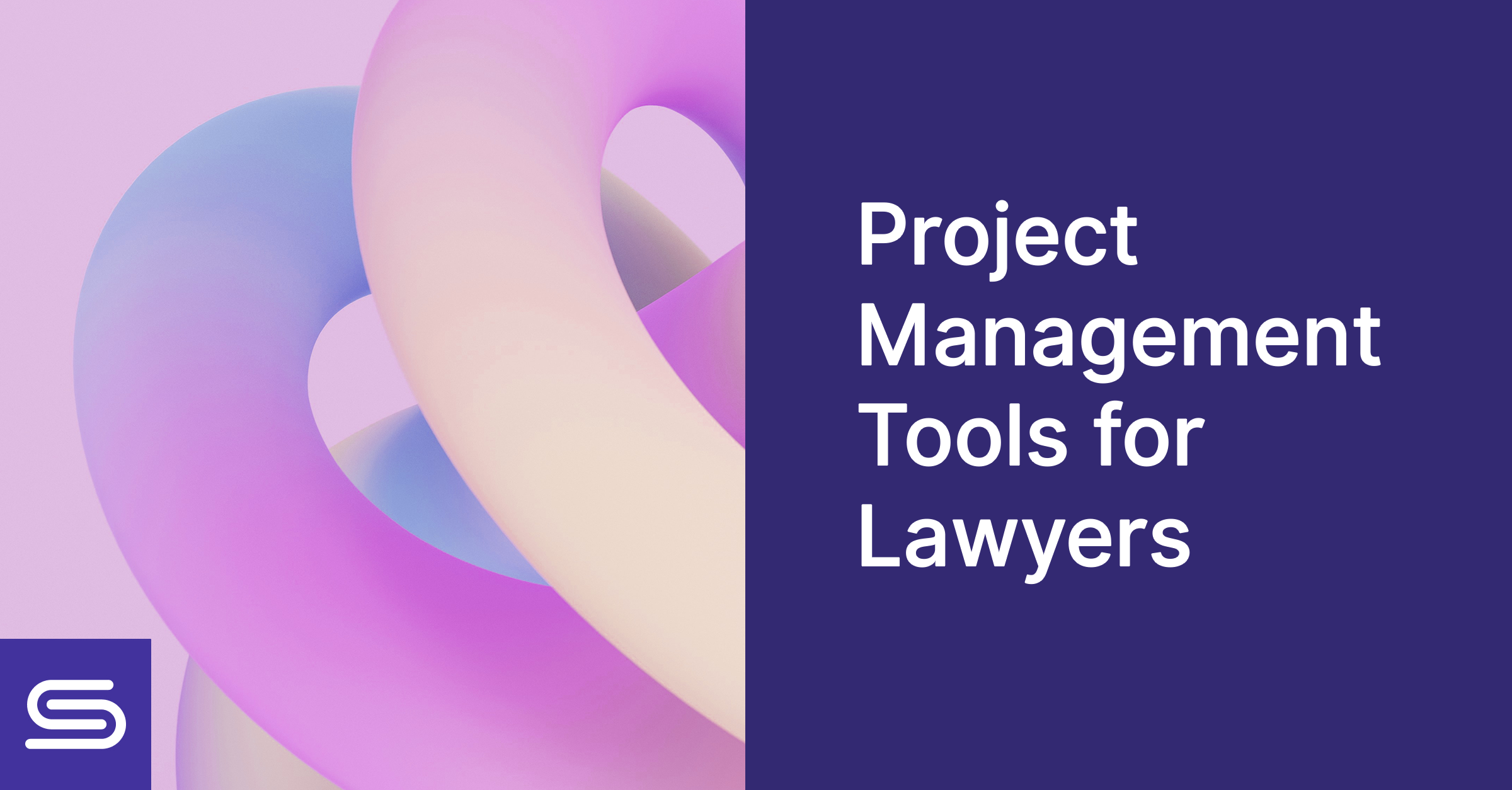
In-house legal teams are a busy lot; their inboxes are often overflowing with contract reviews, compliance questions, vendor agreements, and NDAs. They can work nights and weekends, but still be perceived as a bottleneck.
The problem usually isn't the team's work ethic or expertise, but the lack of a proper project management infrastructure. The truth is, generic task managers are not designed for legal operations. Legal teams require purpose-built solutions that understand the unique workflow challenges of corporate legal departments.
This guide evaluates 15 project management tools that can help in-house legal teams regain control, demonstrate value, and finally shed the "black box" reputation. It covers general project management platforms that legal teams adapt, as well as legal-specific solutions designed for corporate legal operations.
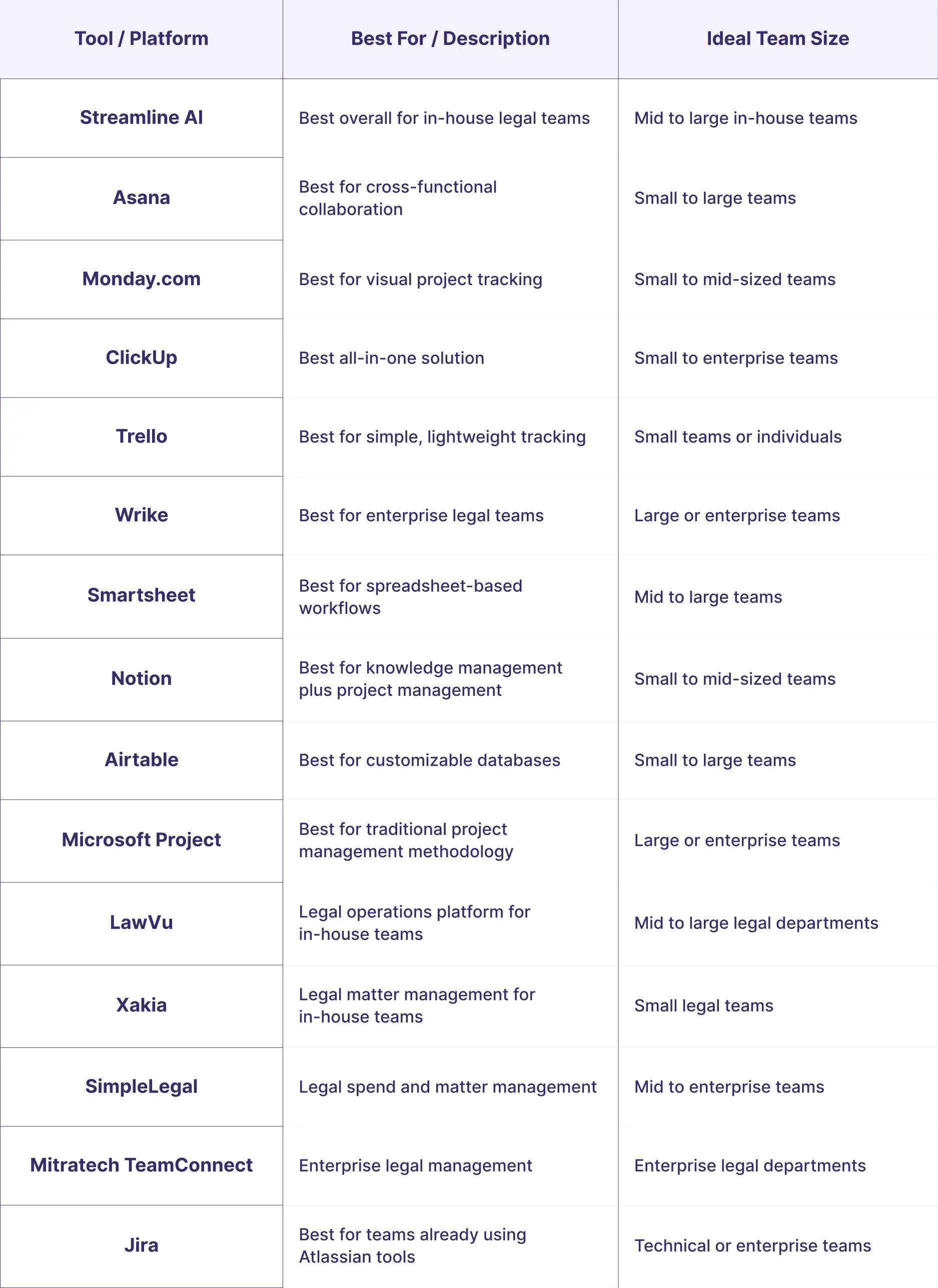
Best overall for in-house legal teams
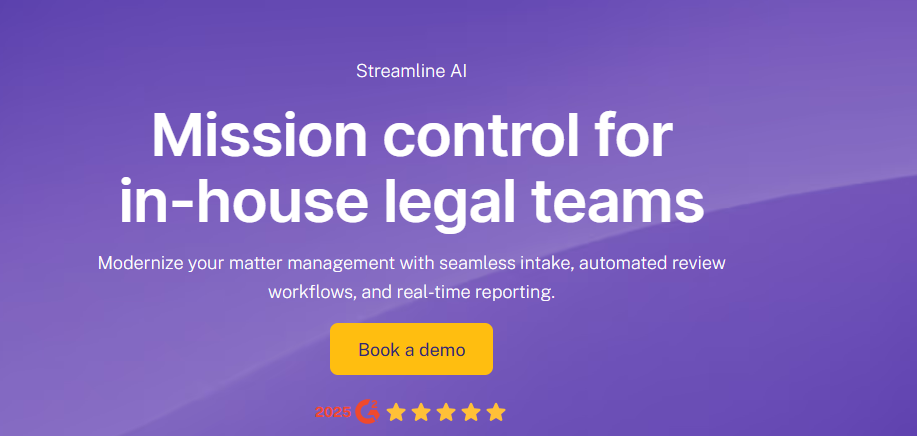
Streamline AI is an AI-powered legal workflow platform built for in-house legal departments. Unlike generic project management tools that require endless customization, Streamline AI adapts to legal processes with an intuitive interface that allows legal teams to configure it without IT support.
Founded by Kathy Zhu, a former Associate General Counsel at DoorDash, Streamline addresses the exact problems she encountered while scaling DoorDash's legal department during its explosive growth.
Today, over 500 attorneys at top companies utilize Streamline AI, as it revolutionizes the way legal operations are conducted. Instead of chasing down status updates in email or maintaining outdated spreadsheets, legal teams gain real-time visibility into every request and matter.
Streamline AI provides complete legal workflow management through:
Legal teams using Streamline AI often see remarkable reductions in time-to-close for legal requests. The platform's AI-powered email intake eliminates the back-and-forth of gathering information.
When a business stakeholder sends an unstructured email request, Streamline AI reads it, extracts relevant details, and creates a structured request with all necessary information. This enables legal teams to begin work immediately, rather than spending hours clarifying requirements.
One of the most valuable aspects of Streamline AI is its ability to detect where delays actually occur. Legal departments are frequently blamed for slow turnaround times, but the reality is that business requesters often prolong the process for extended periods.
Streamline AI provides end-to-end visibility, showing exactly how long each stakeholder spends on their portion of the workflow. With a data-driven approach, legal teams can present clear metrics showing the impact on legal operations.
Many in-house legal teams struggle to justify additional headcount or budget because they lack concrete data about workload and capacity. Streamline AI solves this by automatically tracking every aspect of legal work.
General Counsels can show CFOs exactly how many requests the team handles per week, which practice areas face the highest volume, and where additional resources would have the greatest impact.
A common failure point for legal workflow tools is requiring business stakeholders to learn new systems. Streamline AI takes a different approach by enabling requesters to submit legal requests and receive updates through the channels they already use, be it email, Slack, or Microsoft Teams.
Furthermore, legal teams work on a unified platform that consolidates all requests, regardless of the originating channel. This reduces change management challenges and drives actual adoption.
Streamline AI offers custom pricing based on team size and needs. Unlike tools that charge per user across the entire company, Streamline AI’s pricing model focuses on the size of the legal team, making it cost-effective even for departments serving large organizations.
Getting started with Streamline AI begins with a demo, during which the team learns about your current legal intake and matter management processes. The implementation takes 2-4 weeks and includes:
The platform's intuitive design enables team members to create and modify forms, set up new workflows, and adjust processes without requiring IT assistance. This flexibility allows your legal operations to adapt as your business needs evolve.
Best for cross-functional collaboration
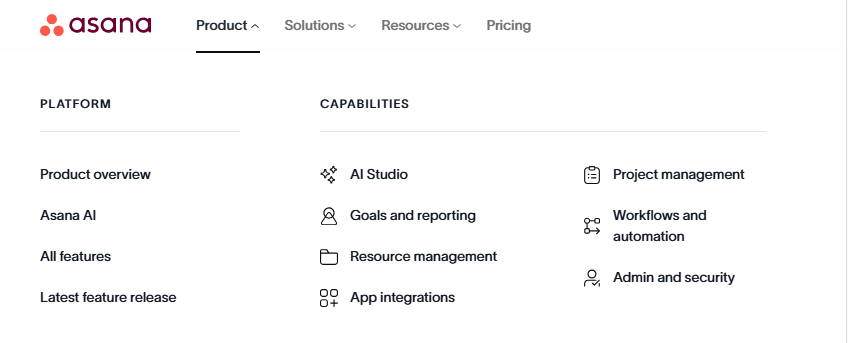
Asana is a popular project management platform that many legal teams adapt for tracking matters and managing legal work. Its strength lies in cross-functional collaboration, making it useful when legal teams need to coordinate with other business stakeholders.
Asana offers task management, project tracking, and team collaboration through customizable boards, lists, and timelines. Legal teams can create projects for different matter types, assign tasks to team members, set due dates, and track progress through various workflow stages.
The platform's visual interface makes it easy for non-legal stakeholders to understand project status. Legal teams can create custom fields for legal-specific information and appreciate the robust integration ecosystem that connects to tools already in use.
Asana works well for legal departments handling a moderate volume of relatively straightforward matters. Teams that need to collaborate extensively with business units find value in Asana's commenting and file-sharing features.
Asana wasn't built for legal departments. Teams often experience limitations when trying to adapt it for legal workflows. It has no native legal intake functionality, meaning requests still arrive through various channels and must be manually entered into Asana.
Furthermore, the platform lacks legal-specific features like matter tracking, conflict checking, or integration with contract lifecycle management systems.
Setting up automated workflows for different legal request types requires significant configuration effort. Unlike purpose-built legal platforms, Asana doesn't understand the nuances of legal processes like triage, assignment based on practice area, or approval routing.
Asana offers a free tier for basic task management, with paid plans starting around $10.99 per user per month. For larger legal teams needing advanced features, the Business plan costs $24.99 per user per month.
Best for visual project tracking

Monday.com is a highly visual project management platform ideal for teams wanting to see all their work at a glance. Legal departments use it to track matters, manage legal requests, and coordinate across practice areas.
The platform centers on customizable boards with color-coded columns, visual status indicators, and timeline views. Legal teams can build boards for different types of legal work, automate routine processes, and generate reports on team workload.
Monday.com's visual approach makes project status immediately apparent. Legal teams can quickly identify which matters require attention, which are pending with other teams, and which are at risk of missing deadlines. The platform offers extensive customization, enabling legal teams to tailor their boards to their existing processes.
Automation helps reduce manual work. Teams can set up rules, such as automatically assigning matters based on type, sending reminders before deadlines, or notifying stakeholders when the status changes.
Like Asana, Monday.com requires substantial setup to accommodate legal-specific workflows. It lacks a built-in legal intake system that’s connected to other applications, a native understanding of legal matter types, statuses that reflect when something is waiting on a team outside of legal to weigh, and purpose-built reporting for legal metrics.
While Monday.com looks great, it doesn't reduce the actual operational burden of managing legal work. Requests still arrive via email or Slack, so someone still needs to create items in it manually, and the platform doesn't provide legal-specific analytics, such as time spent on different matter types or SLA compliance by practice area.
Monday.com starts at $9 per user per month for the Basic plan, with the Standard plan at $12 per user per month, and the Pro plan at $19 per user per month. Enterprise pricing is available for larger teams.
Best task management solution
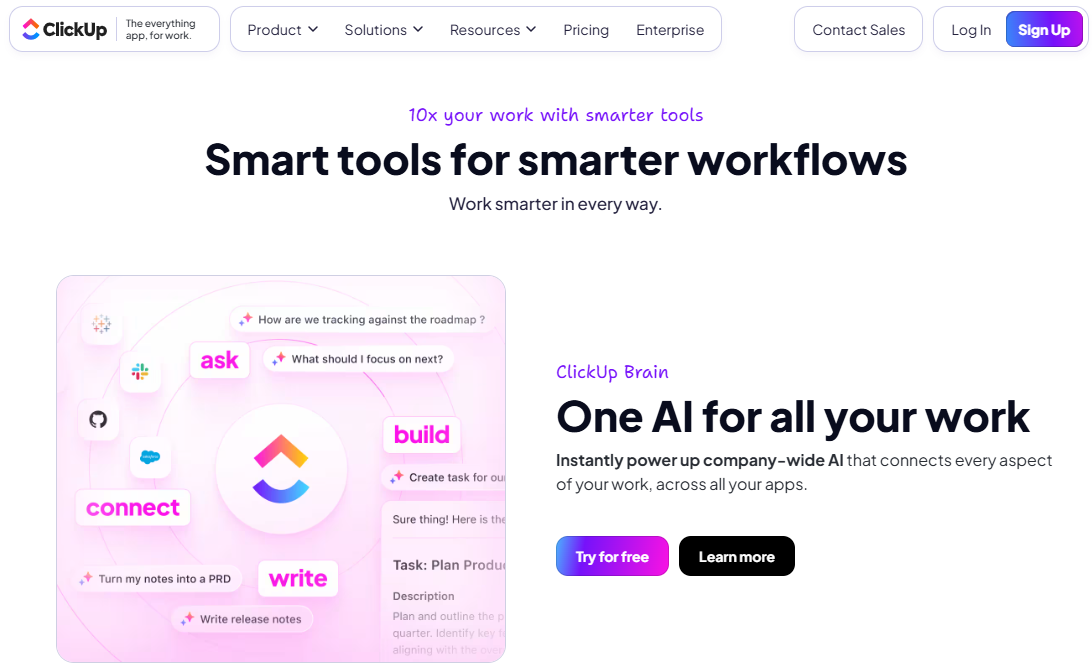
ClickUp positions itself as the "one app to replace them all," combining project management, document collaboration, goal tracking, and time management in a single platform.
ClickUp provides tasks, docs, goals, whiteboards, and chat functionality. Legal teams can create hierarchical structures for their work, from spaces (for different practice areas) down to individual tasks. The platform includes automation, custom fields, and various view options, including lists, boards, Gantt charts, and calendars.
ClickUp's comprehensive feature set enables legal teams to manage various aspects of their work without needing to switch between tools. The platform supports complex workflows with dependencies, subtasks, and multiple assignees. Teams that want extensive customization options find ClickUp's flexibility useful.
The platform includes time tracking, which can be valuable for legal departments seeking to track hours spent on different matters or projects.
ClickUp's main strength—extensive features and customizability—is also its main weakness for legal teams. The platform has a steep learning curve, and the abundance of options can feel overwhelming. Legal teams often spend weeks or months configuring ClickUp to match their workflows, only to find they need to reconfigure as processes evolve.
This app has no legal-specific functionality. It doesn't understand legal intake, matter management, or the specific workflows common in corporate legal departments. Everything must be built from scratch using the platform's generic project management building blocks.
ClickUp offers a free tier with limited features. The Paid plan starts at $7 per user per month for Unlimited, $12 per user per month for the Business plan, and custom pricing for Enterprise.
Best for simple, lightweight tracking
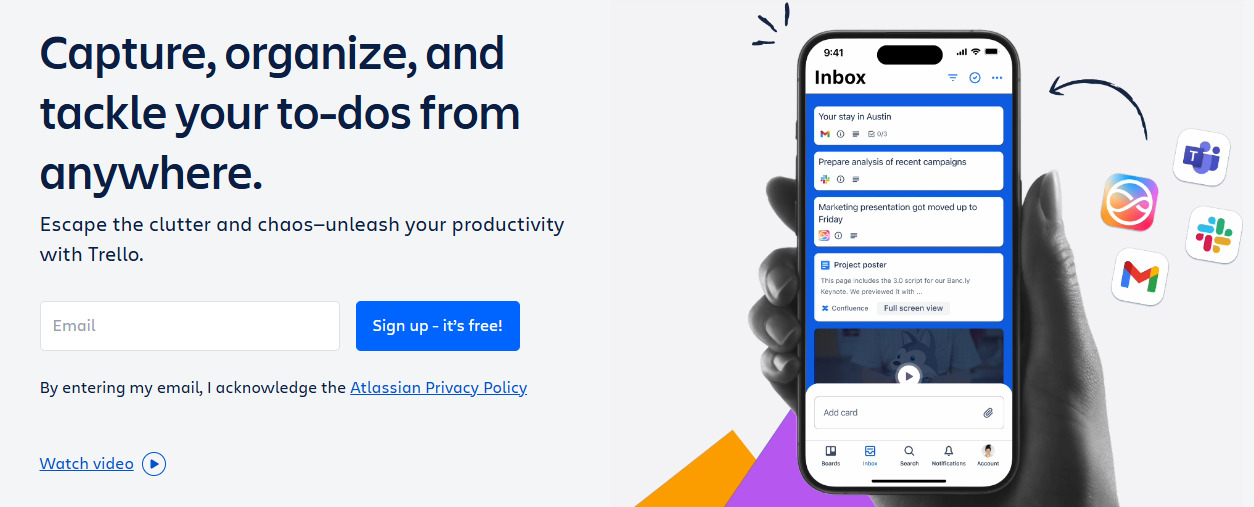
Trello uses a card-based Kanban system to organize work. Its simplicity appeals to small legal teams or those just beginning to move beyond email and spreadsheets.
Trello organizes work into boards, which contain lists of cards. Each card represents a task or matter. Legal teams can move cards between lists to represent workflow stages, add checklists, attach files, and assign team members to tasks.
Trello's visual simplicity makes it easy to learn and adopt. Small legal teams with straightforward workflows can quickly set up basic matter tracking. The mobile app works well for on-the-go updates.
For legal departments handling a low volume of requests or using Trello alongside other systems, its lightweight nature can be an advantage rather than a limitation.
Trello's simplicity can be limiting as legal operations grow more complex. It has minimal automation capabilities, limited reporting, and no features specific to legal work. Legal teams often outgrow Trello quickly, particularly as request volumes increase or when they require more sophisticated workflow management.
The platform also lacks robust intake functionality, approval workflows, or integration with legal-specific tools. Reporting on team performance, matter types, or workload distribution typically requires manual tracking or the use of third-party add-ons.
Trello offers a free tier with basic functionality. Premium plans cost $5 per user per month, Standard plans $6 per user per month, and Enterprise plans $17.50 per user per month.
Best for enterprise legal teams
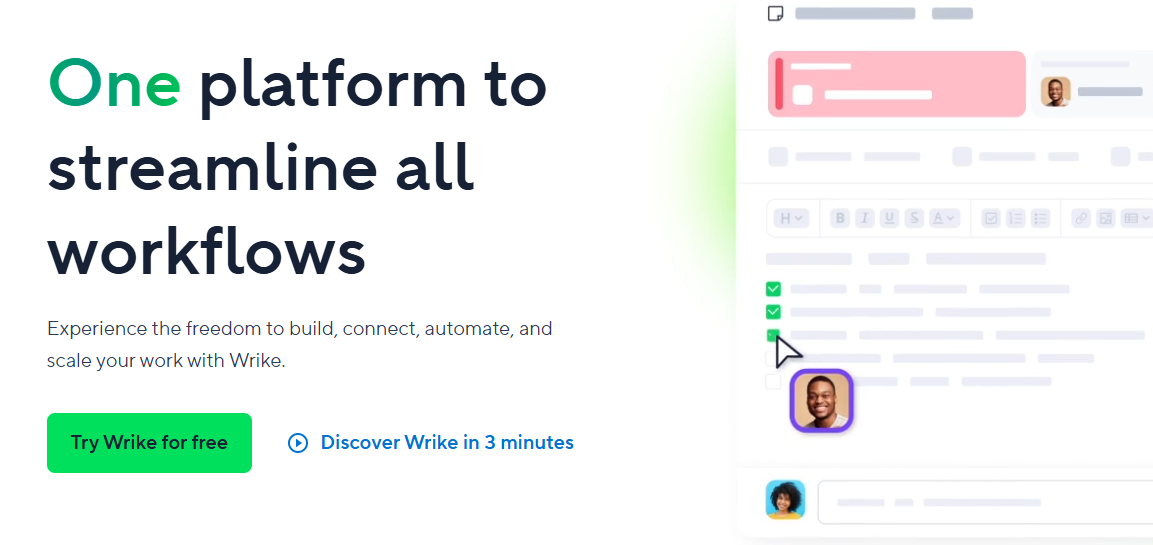
Wrike targets enterprise organizations with complex project management needs. Larger in-house legal departments sometimes use Wrike for its scalability and advanced features.
Wrike provides project management, resource allocation, time tracking, and reporting capabilities. The platform supports complex workflows, dependencies, and cross-functional collaboration. Legal teams can create custom workflows, set up approval processes, and generate detailed reports to streamline their operations.
Wrike's ability to handle complex organizational structures and workflow benefits enterprise legal teams. The platform supports advanced permission controls, which are helpful when legal teams need to maintain confidentiality while collaborating with business stakeholders.
Wrike's reporting capabilities surpass those of most general project management tools. Legal operations teams can generate reports on team utilization, project timelines, and workload distribution.
Wrike's enterprise focus means it comes with enterprise complexity and pricing. For smaller legal teams, it can be overwhelming and expensive. The learning curve is significant, and full implementation often requires dedicated project management resources.
Like other general project management tools, Wrike lacks legal-specific features. Legal teams must build their own intake processes, matter management workflows, and custom reporting for legal metrics.
Wrike offers five pricing tiers for different team sizes and complexity levels. The Free plan provides basic task management for unlimited users with no cost. The Team plan costs $10 per user per month for 2-15 users and includes unlimited projects, Gantt charts, and generative AI features.
The Business plan, their most popular option at $25 per user per month, supports 5-200 users and adds advanced capabilities, like resource planning, unlimited request forms, and file proofing across 30+ formats.
The Enterprise plan provides enhanced security features, including SAML-based SSO, two-factor authentication, and custom access roles for teams of 5 to unlimited users.
The top-tier Pinnacle plan offers the most sophisticated tools, including locked spaces for confidential work, advanced reporting and BI, budgeting and billable hours tracking, and 15 GB storage per user. All paid plans require annual billing.
Best for spreadsheet-based workflows
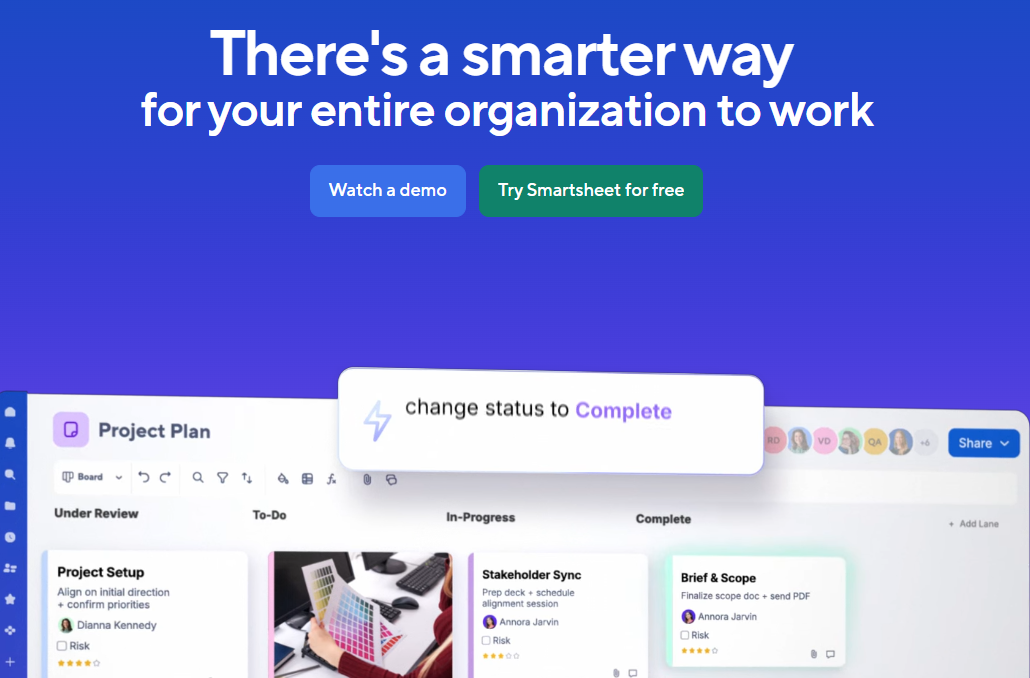
Smartsheet bridges the gap between spreadsheets and project management software. Legal teams comfortable with Excel or Google Sheets sometimes choose Smartsheet because it feels familiar while adding project management capabilities.
Smartsheet offers spreadsheet-style grids with project management features, including Gantt charts, card views, calendars, and automated workflows. Legal teams can create sheets for tracking matters, managing requests, and coordinating legal work.
For legal teams already using spreadsheets, Smartsheet offers a natural evolution. The spreadsheet interface feels familiar, reducing the learning curve. Teams can import existing Excel or Google Sheets trackers and enhance them with automation and collaboration features.
Smartsheet's form functionality enables business stakeholders to submit structured information, serving as a basic intake system. The platform's reporting capabilities help legal operations teams analyze workload and performance.
While Smartsheet improves upon static spreadsheets, it retains many of the limitations inherent in spreadsheets. It doesn't offer legal-specific features, and building comprehensive legal workflows requires a significant amount of setup and configuration. Smartsheet works better for tracking than for managing complex legal processes.
The form-based intake is basic compared to purpose-built legal intake solutions. There's no AI to process unstructured requests, no automatic routing based on request type, and no intelligent triage.
Smartsheet offers four main pricing tiers that scale with organizational needs. The Pro plan starts at $9 per month per member. The Business plan costs $19 per member per month, while the Enterprise and Advanced Work Management plans are custom-priced.
Best for knowledge management plus PM
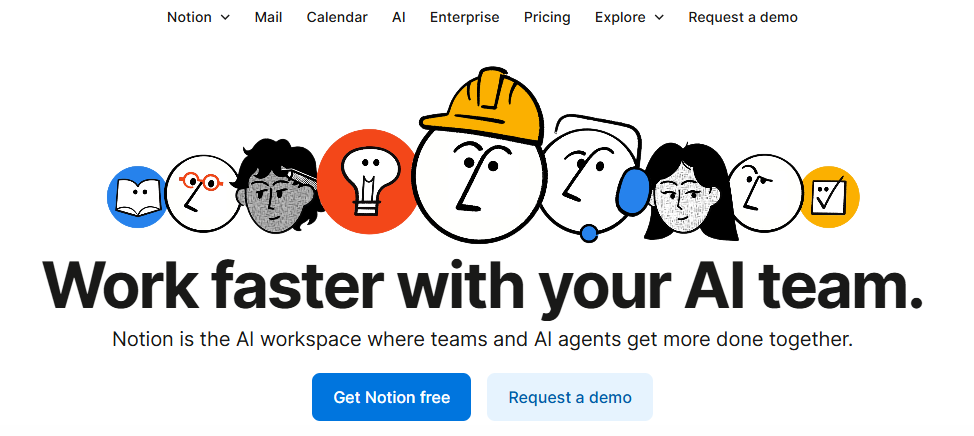
Notion combines wiki-style documentation, databases, and project management. Legal teams attracted to its flexibility use Notion for both knowledge management and workflow tracking.
Notion provides pages, databases, and boards that can be interconnected. Legal teams can create wikis for legal playbooks and policies, databases for matter tracking, and kanban boards for workflow management. The platform's flexible structure enables teams to organize information in a manner that makes sense to them.
Notion excels at combining knowledge management with project tracking. Legal teams can maintain contract playbooks, legal policies, and best practices in the same system they use for tracking matters. The platform's clean interface and flexibility suit teams wanting to design their own systems.
For legal departments focused on building a knowledge base alongside matter management, Notion's versatility provides value. Teams can link related information, embed files, and create comprehensive resources that are easily accessible and organized.
Notion's flexibility can be problematic for legal teams that require rapid action. Building effective systems requires significant upfront design work, and maintaining consistent structure across a team demands discipline and documentation.
The platform lacks workflow automation capabilities found in dedicated project management tools. Additionally, it lacks legal-specific functionality, lacks an intake system, and has limited integration with legal technology tools. Reporting and analytics capabilities are basic compared to purpose-built solutions.
Notion offers a free plan for individuals. The Plus plan costs $10 per user per month, Business is $20 per user per month, and Enterprise pricing is custom-priced.
Best for customizable databases
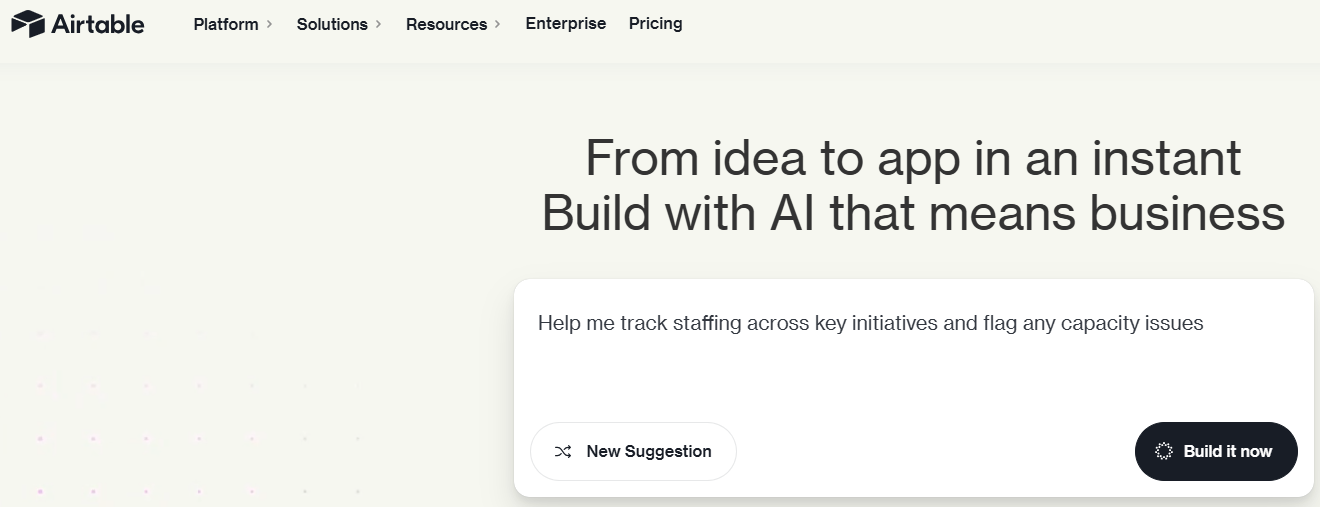
Airtable combines database functionality with a spreadsheet-like interface and project management views. Legal teams wanting highly customized systems sometimes build their legal operations infrastructure on Airtable.
Airtable provides flexible databases (called "bases") with various view options, including grid, calendar, kanban, and gallery. Legal teams can create relational databases connecting matters, requests, stakeholders, and documents. The platform supports automation, integrations, and custom apps.
Airtable's power lies in its database flexibility. Legal teams can design exactly the data structure they need, create relationships between different types of information, and build custom interfaces for various stakeholders. Teams comfortable with database concepts can create sophisticated systems.
The platform's automation capabilities help streamline workflows. Legal operations teams can trigger actions based on field changes, send notifications to stakeholders, and automatically update related records.
Building effective systems in Airtable requires specialized database design skills and a significant amount of time. Legal teams without technical resources struggle to implement and maintain Airtable-based solutions. The platform is a powerful tool for building custom solutions, but it requires building everything from scratch.
It lacks pre-built legal workflow logic, an intake system, and specialized legal features. Every aspect of legal operations must be designed and implemented using Airtable's generic database building blocks. This approach works well for teams with dedicated legal operations resources, but can overwhelm legal departments that are already stretched thin.
Airtable offers a free tier with basic functionalities. Team plans cost $20 per seat per month, Business plans $45 per seat per month, and Enterprise pricing is custom.
Best for traditional PM methodology
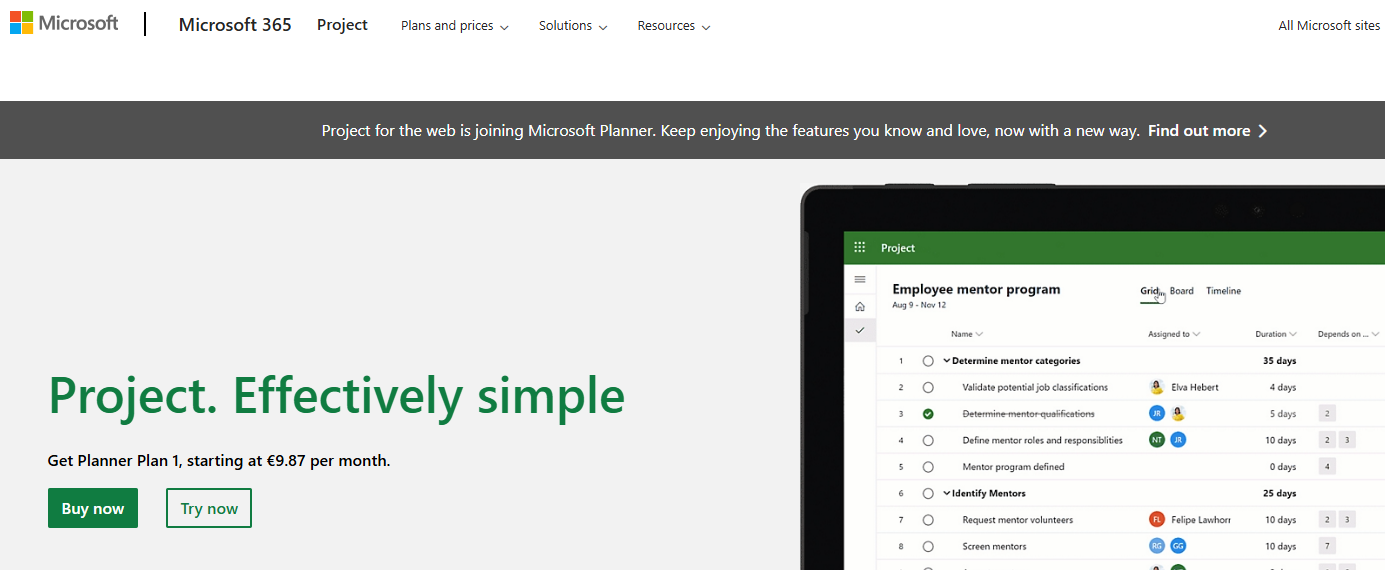
Microsoft Project is the traditional heavyweight of project management software. Enterprise legal departments utilize it, particularly when the broader organization already has a Microsoft Project infrastructure in place.
Microsoft Project offers comprehensive project planning, scheduling, resource management, and reporting capabilities, utilizing traditional project management methodologies. The tool supports Gantt charts, critical path analysis, resource leveling, and detailed project tracking.
For legal departments managing large, complex initiatives with many interdependencies, Microsoft Project's robust planning capabilities can be valuable. The tool excels at scheduling complex projects, managing resources across multiple initiatives, and analyzing project timelines.
Organizations already using Microsoft Project across other departments benefit from consistency and integration with the broader Microsoft ecosystem.
Microsoft Project is an overkill for typical legal department workflows. The tool was designed for construction projects and IT implementations, not for managing legal requests and matters. Its complexity, steep learning curve, and traditional project management approach don't align well with how most legal teams work.
The platform lacks legal-specific features and doesn't address the core challenges that in-house legal teams face, including intake management, matter tracking, business collaboration, and demonstrating value through metrics.
Microsoft Project pricing starts around $10 per user per month for Plan 1, $33 for Plan 3, and $60 for Plan 5, per user per month.
Legal operations platform for in-house
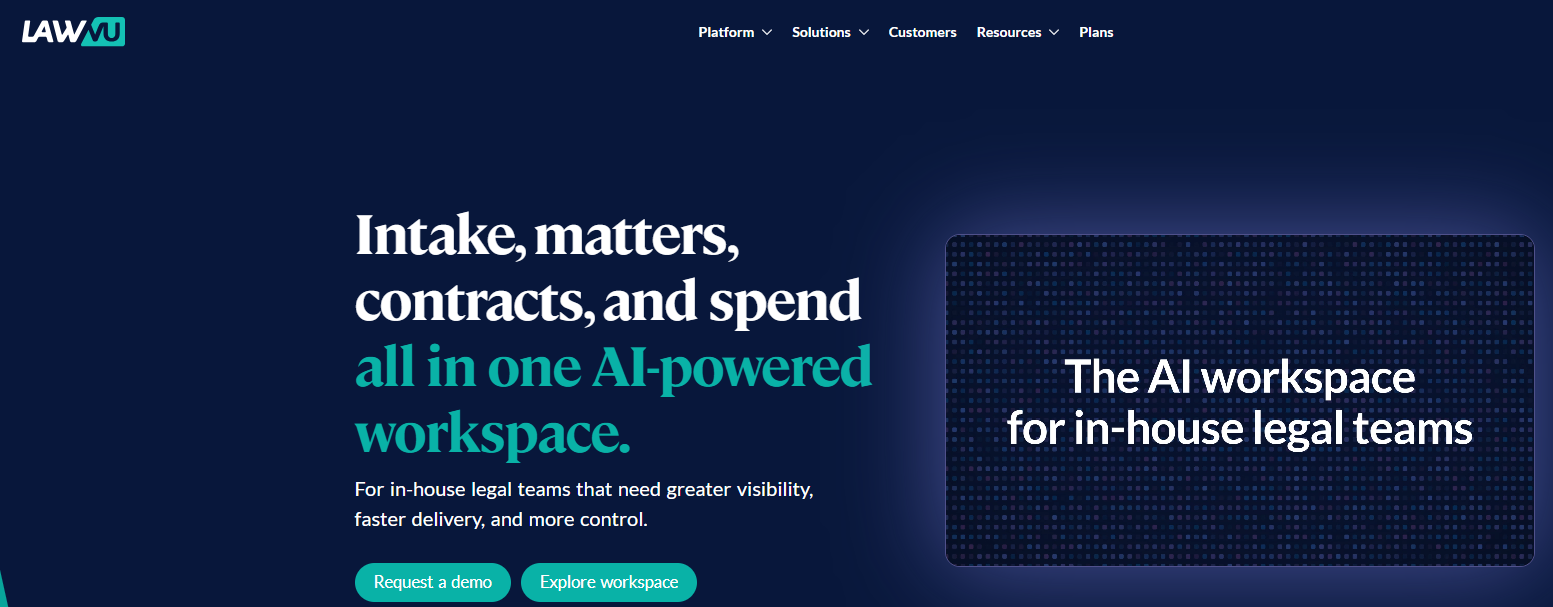
LawVu is a purpose-built legal operations platform specifically for in-house legal teams. It combines matter management, contract lifecycle management, and legal intake in a unified system.
LawVu offers legal matter management, contract management, legal project management, intake workflows, and spend management. The platform is designed for corporate legal departments and includes features like outside counsel management and legal analytics.
As a legal-specific platform, LawVu understands in-house legal workflows better than generic project management tools. The platform includes pre-built templates for standard legal processes and offers specialized legal reporting capabilities.
LawVu's contract management integration enables legal teams to manage both contracts and non-contractual legal work within a single system. This unified approach can be valuable for teams wanting to consolidate their legal tech stack.
LawVu's feature set comes with complexity. Implementation typically takes months rather than weeks, and the platform requires significant change management to drive adoption and a system administrator who can dedicate considerable time with the ongoing management of the tool. The user interface feels less intuitive than more modern alternatives.
The platform's CLM-first approach means teams primarily focused on intake and matter management may find they're paying for features they don't need. Integration with existing business tools can require IT involvement.
LawVu uses custom pricing models based on company size and selected modules. Implementation and training come at additional costs.
Legal matter management for small in-house teams
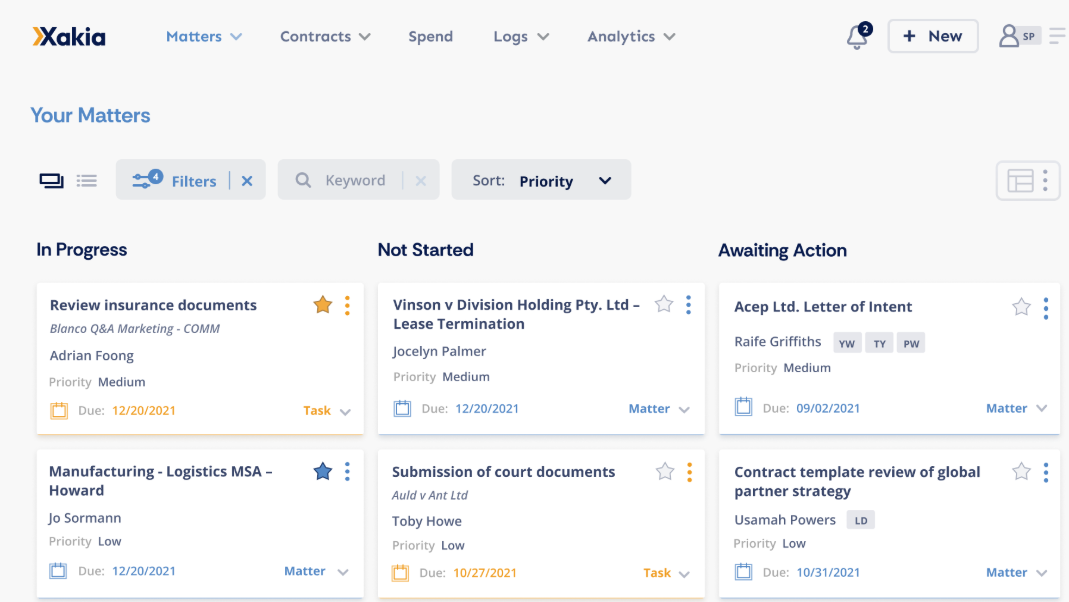
Xakia focuses specifically on legal matter management for corporate legal departments. The platform targets in-house teams wanting sophisticated matter tracking without the complexity of full enterprise legal management systems.
Xakia offers matter management, legal request intake, workflow automation, and reporting solutions. The platform includes tools for tracking matters across practice areas, managing the workload of the legal team, and generating insights into the performance of the legal department.
Xakia's focus on matter management means it provides depth in this area. Legal teams can track detailed information about each matter, collaborate with stakeholders, and generate reports on matter volume, cycle time, and team capacity.
The platform features intake functionality for collecting information from business requesters and routing matters to appropriate team members based on practice area and workload.
Xakia's interface and user experience appear dated compared to those of modern legal tech platforms. It also doesn’t have AI-powerd capabilities like other modern solutions. Moreover, the setup requires significant configuration, while its flexibility comes with complexities.
The platform's reporting, while comprehensive, requires effort to configure and maintain. Teams seeking out-of-the-box insights into their legal operations may need to invest time in setting up custom reports.
Xakia offers tiered pricing based on the size of your legal team. The Advanced plan is priced at $90 per user per month, the Professional plan at $110 per user per month, and the Enterprise plan at $150 per user per month.
Legal spend and matter management
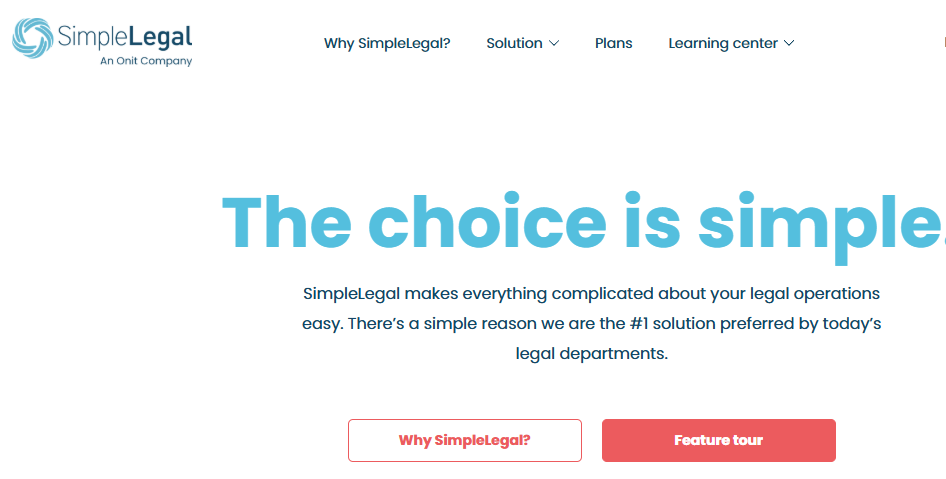
SimpleLegal combines legal spend management with matter tracking, targeting legal departments wanting to manage outside counsel spend and internal legal work in one system.
SimpleLegal offers comprehensive solutions for invoice management, matter tracking, vendor management, and legal operations analytics. The platform emphasizes financial aspects of legal operations alongside workflow management.
For legal departments spending significant amounts on outside counsel, SimpleLegal's spend management capabilities provide value. The platform can process invoices, track outside counsel spend by matter, and provide visibility into legal department costs.
Matter management capabilities allow teams to track both internal work and matters handled by outside counsel, providing a complete picture of legal operations.
SimpleLegal's strength in spend management makes the platform most valuable for departments with substantial expenditures on outside counsel. However, for teams also focused on managing and reporting on internal legal work, SimpleLegal's matter management capabilities are less comprehensive than other alternatives.
The platform's intake and collaboration functionality is more basic than purpose-built intake solutions. Teams looking for sophisticated workflow automation, connected intake pathways, and AI-powered intake may need to look elsewhere.
SimpleLegal uses custom pricing based on company size and outside counsel spend volume.
Enterprise legal management
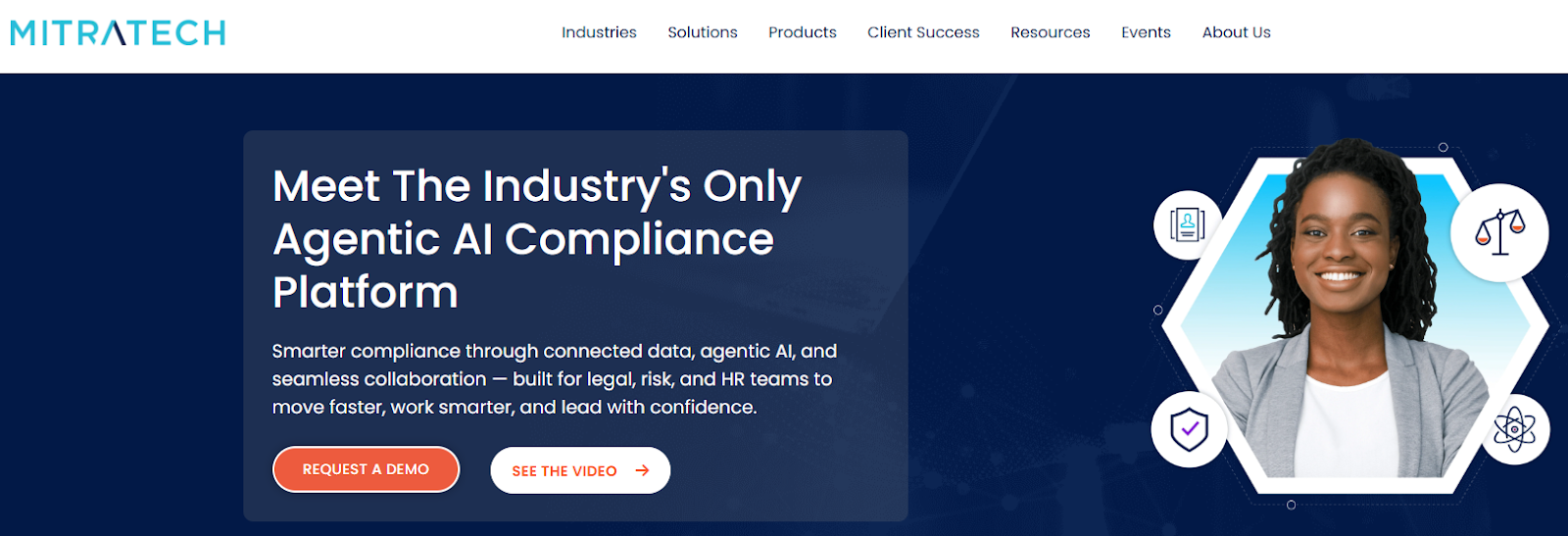
Mitratech TeamConnect is an enterprise legal management platform targeting large corporate legal departments. It provides extensive functionality for matter management, spend management, and legal operations.
TeamConnect offers matter management, contract lifecycle management, spend management, legal hold, and analytics. The platform is designed for enterprise legal departments managing high volumes of matters and complex legal operations.
Enterprise legal departments with sophisticated needs appreciate TeamConnect's depth of functionality. The platform can handle complex organizational structures, support multiple legal entities, and provide detailed reporting across all aspects of legal operations.
For organizations already using other Mitratech products, TeamConnect integrates with the broader Mitratech suite of legal technology.
TeamConnect's enterprise focus means significant complexity and cost. Implementation typically takes many months and requires dedicated resources. The platform's user interface reflects its legacy origins, feeling less modern than newer alternatives.
Smaller legal teams or those wanting to move quickly will find TeamConnect overwhelming. The platform requires substantial configuration, training, and ongoing administration.
Mitratech TeamConnect utilizes custom pricing, which usually involves significant licensing costs and implementation fees.
Best for teams already using Atlassian

Jira is Atlassian's project management platform, originally designed for software development teams. Some legal departments use Jira, particularly when IT mandates company-wide use of Atlassian tools.
Jira provides issue tracking, workflow management, and project boards. Legal teams can create custom issue types for specific legal matters, configure workflows tailored to different request types, and track work through various stages.
Organizations already using Atlassian tools benefit from consistency and integration with Confluence for documentation and other Atlassian products. Teams comfortable with Jira's concepts and interface can adapt it for legal workflows.
Jira's customization capabilities enable legal teams to create sophisticated workflows, although this requires technical expertise and ongoing maintenance.
Jira was built for software development, not legal operations. The platform's terminology, concepts, and workflows reflect its origins. Legal teams consistently report that Jira feels unintuitive and requires extensive configuration to approximate legal workflows.
Setting up even basic legal intake and matter management in Jira typically requires IT support. Making changes to workflows, adding new request types, or modifying processes isn't something legal team members can do themselves, making it slower to set up and less adaptable than purpose-built legal platforms.
Jira offers a free tier for up to 10 users. Standard plans cost $7.91 per user per month, Premium plans $14.54 per user per month, with Enterprise pricing available upon request.
Selecting the right project management tool for your legal department requires understanding your specific needs, constraints, and goals. Here's what to consider:
Begin by identifying the specific problems you aim to solve. Is your legal team drowning in email-based requests with no centralized tracking? Are you struggling to demonstrate that Legal isn't actually the bottleneck? Do you lack visibility into team workload and capacity?
Different tools address different pain points. Generic project management platforms help with basic task tracking, but they won't solve legal-specific challenges, such as intake management or generating data to justify additional headcount. Purpose-built legal platforms understand these unique needs but vary in their specific focus areas.
Some platforms require database design skills or IT support for configuration and setup. Others empower legal operations professionals to set up workflows without technical assistance. Honestly assess your team's technical capabilities and available resources.
If your legal ops team consists of lawyers without IT backgrounds, platforms requiring extensive configuration or ongoing technical maintenance will create dependency on overburdened IT teams. Tools that legal professionals can configure themselves provide more agility and faster time to value.
The best legal automation tools strike a balance between power and accessibility, offering sophisticated capabilities through intuitive interfaces.
Your project management tool needs to connect with the systems the legal team and business stakeholders already use. Consider what integrations are essential:
Generic project management tools often have broad integration libraries but may lack connections to legal-specific systems. Legal platforms usually integrate deeply with legal tech, but may have gaps in general business tool integrations.
Understanding what you can streamline requires mapping your existing tool landscape and identifying critical integration points.
Legal departments have unique workflows that vary by practice area, company size, and industry. Some teams need extensive customization to match their specific processes. Others prefer pre-built templates they can use immediately.
Highly flexible platforms provide blank canvases, allowing teams to build exactly what they need, but require significant time investment. Purpose-built legal platforms offer tailored workflows based on best practices, which can accelerate implementation but may not perfectly match your current processes.
Consider whether you're willing to adapt your processes to match the tool's workflows or whether you need the tool to adapt to your existing processes. There's no universally correct answer, but understanding your preference helps narrow options.
Generic project management tools can be set up quickly for basic use but require weeks or months to configure for sophisticated legal workflows. Purpose-built legal platforms vary widely, with some requiring multi-month implementations and others going live in weeks.
The implementation timeline affects not only when you realize value but also the team bandwidth required during setup. Extended implementations strain already busy legal teams, while rapid deployments allow teams to start seeing benefits quickly.
Consider your team's capacity to manage an implementation project alongside regular legal work. Tools with strong customer success support and pre-built templates typically accelerate time to value.
The best tool delivers no value if people don't use it. Consider how much change management each option requires across two groups: your legal team and business stakeholders who submit legal requests.
Tools requiring business requesters to learn new systems face significant adoption challenges. Platforms that meet requesters where they already work (email, Slack, Teams) reduce resistance. For your legal team, intuitive interfaces and clear workflows drive adoption more effectively than feature-rich but complex systems.
In-house legal teams face a unique set of challenges that generic project management tools weren't designed to solve. While platforms like Asana, Monday.com, and ClickUp offer solid task tracking and collaboration capabilities, they often require extensive customization to effectively handle legal-specific workflows.
Purpose-built legal operations platforms understand these unique needs but vary in their approach and implementation complexity. For most in-house legal departments, the ideal solution combines powerful legal-specific features with an intuitive interface that doesn't require IT support for configuration.
The platform should meet business requesters where they already work rather than forcing them to learn new systems. It should also provide out-of-the-box analytics that demonstrate legal's value.
If your legal team is ready to move beyond spreadsheets, eliminate the "bottleneck" perception, and finally obtain the data you need to justify additional resources, Streamline AI offers a purpose-built solution that can be set up in weeks instead of months.
Unlike generic project management tools that require endless customization, Streamline AI adapts to legal processes with an intuitive interface that can be configured without IT support.
The platform's AI-powered intake reduces legal request cycle time by up to 50%, and provides the data-driven insights you need to transform conversations with business leaders from defensive to strategic.
Project management software focuses on task coordination, deadlines, and collaboration across all types of projects. Matter management software is purpose-built for legal work, offering features such as intake workflows, practice area routing, legal-specific reporting, and integration with legal technology tools like CLM systems.
Yes, law firms and corporate legal departments have fundamentally different needs. Law firms focus on client billing, time tracking, and matter profitability. In-house legal departments prioritize intake management, demonstrating value to the business, workflow efficiency, and collaborating with internal stakeholders.
Implementation timelines vary based on the tool and your team's needs. Generic project management platforms can be set up for basic use in one to two weeks. However, configuring them for complex legal workflows typically takes longer.
Purpose-built legal platforms, like Streamline AI, take two to four weeks for smaller teams and lightweight processes, and two to six months for more mature legal departments. Consider the initial setup time and ongoing configuration when evaluating options, as your legal workflows will evolve and you'll need to adjust your system accordingly.
In-house legal teams should prioritize intake automation, workflow customization without IT support, integration with business communication tools like email and Slack, legal-specific analytics for demonstrating value, and the ability to meet requesters where they already work rather than requiring them to learn new systems.
Tools that provide real-time visibility into the status of matters, who is handling each step, and how long it takes help legal teams eliminate the bottleneck perception and have data-driven conversations about capacity and resources.
Scale your legal team's efficiency and effectiveness with modern workflow automation tools designed for in-house legal.